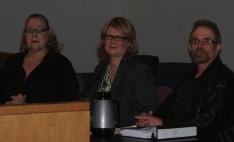Vancouver’s missing women’s inquiry and BC and Ontario court cases challenging Canada’s prostitution laws are all linked, says a friend of a woman who serial killer Robert Pickton was charged with killing.
“It boils down to prostitution,” Wayne Leng tells Xtra. “The laws push women into unsafe conditions.”
Leng was a client and later a close friend of Sarah de Vries, who vanished from Vancouver’s Downtown Eastside April 14, 1998. Charges in de Vries’ murder were stayed after Pickton was convicted of six counts of second-degree murder in December 2007.
Leng spoke to Xtra as he waited to appear before inquiry commissioner Wally Oppal, along with de Vries’ sister Maggie and Vancouver prostitution rights activist Jamie Lee Hamilton.
Hamilton told Oppal the police and the courts pushed prostitutes around Vancouver and set the ground for “the killing fields” of the Downtown Eastside. She said prostitutes working in the West End in the ’70s had been able to group together for safety, to take numbers of cars and to trade notes on bad dates. If someone was gone too long, a search would take place, she said. Hamilton said there was no drug use and survival sex was not known.
But as the late ’70s turned into the ’80s, community groups began to push for the prostitutes to move, she told the inquiry. “It was starting to become a very adversarial time,” she said, noting that groups claiming to shame johns seemed to focus more on shaming prostitutes.
Hamilton said the city would issue $2,000 fines to people standing on the street, a move she said just forced prostitutes to stay out longer to pay the bills.
“That created further harm,” she said. “That could be 40 customers.”
Then came the July 4, 1984, injunction by BC Supreme Court Justice Allan McEachern banning “blatant, aggressive, disorderly prostitutes” from the West End in order to preserve the “peaceful integrity of the community.”
Hamilton said it pushed prostitutes into the dark streets of Mount Pleasant, where clients became more violent and women began using drugs to deal with the pain of their lives. “In Mount Pleasant, women were isolated,” Hamilton said. “They turned to pimps for protection.”
It’s an issue Xtra explored when the film Hookers on Davie marked its 25th anniversary.
Hamilton told Oppal that the push was on to move prostitution north of Hastings and into the alleys and dark streets of the Downtown Eastside. She said police would move women along even if they were just standing together for safety. “I said to the police at the time, ‘Are you not going to be satisfied until we’re pushed into the water?'” Hamilton told Oppal.
She said that with police harassment, increased drug use, more violence, and people throwing rotting food at prostitutes, the survival sex trade began to emerge in the city.
At that point, in order to provide a haven for sex-trade workers, Hamilton opened the Rainbow Room on E Hastings. It would later become Grandma’s House, which offered food, clothing, condoms and a haven from the streets.
“Many of the women were coming into the store,” Hamilton said. “That’s how I first met Sarah de Vries.”
Oppal asked Hamilton what she thought of former Vancouver Police Department chief constable Terry Blythe’s testimony that the streets north of Hastings were well lit.
“I would say that is misleading the commission,” Hamilton responded. “It was awful.”
She said Grandma’s House gave cellphones to sex workers so they could call for help, but police took them away.
Blythe also testified that he supported Grandma’s House as a worthwhile initiative, yet it was raided and closed while he was chief.
Indeed, Hamilton said, when women began to go missing and sex workers began to speak out about it, they were targeted more by police. She doesn’t buy the claims of support.
“If they were, they wouldn’t have shut us down in the middle of a serial killer roaming the Downtown Eastside,” she testified. “If the consequence was to put us at further risk of a serial killer, then the mission was accomplished.”
Blythe’s testimony and the actions of the police under his watch should be weighed carefully by the commission, Leng told Xtra.
“He was talking out of both sides of his mouth,” Leng alleges. “It all started when they pushed them out of the West End. They pushed them to the Downtown Eastside and they closed down the safe house.”
Commissioner lawyer Karey Brooks told Oppal that Hamilton, Maggie de Vries and Leng were appearing together since their narratives merged after the disappearance of de Vries while Pickton was still at large.
Brooks told Oppal the trio’s testimony would “enable a richer evidentiary record.”
“Many women have been murdered and many women have gone missing,” Oppal said. “How do we prevent these tragedies from repeating themselves?” He acknowledged that the dead and vulnerable women “apparently did not have a voice.”
In September 2010, three Ontario sex workers — Terri-Jean Bedford, Valerie Scott and Amy Lebovitch — got a ruling from the Ontario Superior Court that the laws that prohibit communicating for the purpose of prostitution, bawdyhouses and living on the avails were unconstitutional. That decision is binding only in Ontario but was put on hold while a decision from the Ontario Court of Appeal is pending.
Meanwhile, BC’s Court of Appeal ruled Oct 12, 2010, that former sex worker Sheryl Kiselbach and Downtown Eastside Sex Workers United Against Violence Society (SWUAV) would be allowed to return to BC Supreme Court to challenge the three Criminal Code sections in the public interest. That case is now awaiting a decision after the federal government appealed to the Supreme Court of Canada.

 Why you can trust Xtra
Why you can trust Xtra


